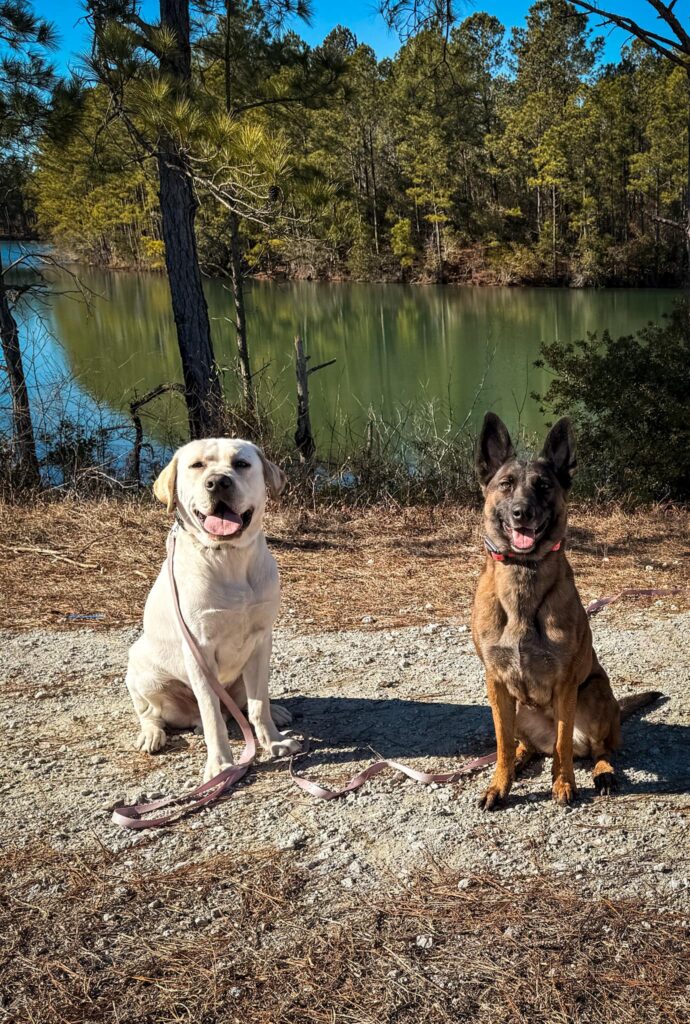“What food is best for my dog?” As professional dog trainers, we get this question all the time. While we’re not veterinarians, our experience has shown that the right diet can greatly support your dog’s behavior, energy, and overall well-being. The best food is one your dog eats consistently, matches their lifestyle, and contains high-quality ingredients.
Why Your Dog’s Diet Matters
Low-quality food can negatively affect both your dog’s health and behavior. Poor nutrition may lead to hyperactivity, anxiety, or difficulty focusing during training. While food isn’t a magic fix, a balanced diet supports brain and body health, making your dog more receptive to training.
What to Look for in Dog Food
Quality Protein
Look for whole proteins like chicken, salmon, or beef as the first ingredient.
Avoid Artificial Ingredients
Brightly colored kibble often contains fillers and chemicals that may contribute to behavioral issues.
Balanced Macronutrients
Ensure the food has the right balance of protein, fats, and carbs to suit your dog’s activity level.
AAFCO Nutritional Adequacy
Check the packaging for this certification to ensure the food meets your dog’s dietary needs.

Tailoring Food to Your Dog
Sensitive Skin? Fish-based food rich in omega fatty acids can support skin and coat health.
Senior Dogs: Foods with glucosamine and chondroitin can promote joint health.
High-Energy Dogs: Higher protein and fat content can fuel their active lifestyle.
Overweight Dogs: “Weight management” formulas can help with calorie control.
Brands We Recommend
Based on our experience, these brands meet the needs of many dogs:
Kibble
Orijen, Acana, Purina Pro Plan, Merrick
Raw/Fresh
Farmer’s Dog, Ollie Fresh, JustFoodForDogs

Note: Always consult your veterinarian for specific dietary concerns or if your dog shows signs of allergies or health issues.
Some brands we don’t recommend:
- Purina Dog Chow, Pedigree, Hills Science Diet, Gravy Train, Iams, Cesars, Kibbles ‘N Bits, Beneful
Transitioning Foods
Switch gradually over 7–10 days to avoid stomach upset. Start with 25% new food mixed with 75% old, and slowly increase the new food.
How Nutrition Impacts Behavior
Good nutrition sets the foundation for successful training. High-quality food supports brain function, helping your dog stay focused, calm, and responsive to training.
Feeding your dog a nutritious diet tailored to their needs is one of the simplest ways to support their health and happiness. Consult your vet if you’re unsure about the best options for your pup, and let us know if you have any training questions—happy to help!
FAQs
1. What’s the best protein for dogs?
Chicken, beef, salmon, or lamb—choose whole proteins listed first on the label.
2. Can food affect behavior?
Yes! Poor diets can cause hyperactivity or anxiety. Quality food supports better focus and training.
3. How often should I feed my dog?
Adults: twice daily. Puppies: 3–4 smaller meals.
4. When should I consult a vet about my dog’s diet?
If your dog has allergies, digestive issues, or weight changes, consult your vet for guidance.
5. Is grain-free food better?
Only if your dog has a grain allergy. Focus on ingredient quality.
Jenny Klamm, owner of AvidDog Dog Training, has been professionally providing dog training in Wilmington, NC, and surrounding areas since 2017. Passionate about ethical and effective training, she specializes in rehabilitating dogs with aggression, anxiety, and reactivity. Jenny helps dog owners build trusting bonds with their pets through compassionate training. Book your free consultation today! https://aviddogtraining.com/contact-us/.





74 Responses
https://honda-fit.ru/forums/index.php?autocom=gallery&req=si&img=7032
Awesome https://is.gd/tpjNyL
Good https://is.gd/tpjNyL
Very good https://shorturl.at/2breu
Very good https://shorturl.at/2breu
Good https://shorturl.at/2breu
Good https://lc.cx/xjXBQT
Good https://lc.cx/xjXBQT
Awesome https://lc.cx/xjXBQT
Very good https://t.ly/tndaA
Very good https://t.ly/tndaA
Good https://t.ly/tndaA
Very good https://t.ly/tndaA
Very good https://urlr.me/zH3wE5
Awesome https://rb.gy/4gq2o4
Good https://rb.gy/4gq2o4
Awesome https://rb.gy/4gq2o4
Awesome https://rb.gy/4gq2o4
Very good https://rb.gy/4gq2o4
Good https://rb.gy/4gq2o4
Good https://rb.gy/4gq2o4
Awesome https://rb.gy/4gq2o4
Good https://is.gd/N1ikS2
Awesome https://is.gd/N1ikS2
Very good https://is.gd/N1ikS2
Awesome https://is.gd/N1ikS2
Good https://is.gd/N1ikS2
Good https://is.gd/N1ikS2
Good https://is.gd/N1ikS2
Good https://is.gd/N1ikS2
Good https://is.gd/N1ikS2
Very good https://is.gd/N1ikS2
Good https://is.gd/N1ikS2
Very good https://is.gd/N1ikS2
Good https://is.gd/N1ikS2
Awesome https://is.gd/N1ikS2
Very good https://is.gd/N1ikS2
Very good https://is.gd/N1ikS2
Good https://is.gd/N1ikS2
Good https://is.gd/N1ikS2
Awesome https://is.gd/N1ikS2
Very good https://is.gd/N1ikS2
Awesome https://is.gd/N1ikS2
Very good https://is.gd/N1ikS2
Super https://shorturl.fm/6539m
Cool partnership https://shorturl.fm/a0B2m
Very good https://shorturl.fm/TbTre
Awesome https://shorturl.fm/oYjg5
Cool partnership https://shorturl.fm/FIJkD
Good partner program https://shorturl.fm/N6nl1
Awesome https://shorturl.fm/5JO3e
https://shorturl.fm/9fnIC
https://shorturl.fm/A5ni8
https://shorturl.fm/FIJkD
https://shorturl.fm/j3kEj
https://shorturl.fm/bODKa
https://shorturl.fm/68Y8V
https://shorturl.fm/A5ni8
https://shorturl.fm/YvSxU
https://shorturl.fm/68Y8V
https://shorturl.fm/oYjg5
https://shorturl.fm/6539m
https://shorturl.fm/TbTre
https://shorturl.fm/XIZGD
https://shorturl.fm/6539m
https://shorturl.fm/fSv4z
https://shorturl.fm/Kp34g
https://shorturl.fm/MVjF1
https://shorturl.fm/eAlmd
https://shorturl.fm/retLL
https://shorturl.fm/MVjF1
https://shorturl.fm/PFOiP
https://shorturl.fm/VeYJe
https://shorturl.fm/0oNbA